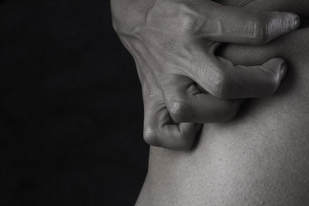 Given the current opioid hysteria, now, even more than ever, we need to be well versed and informed when we are asked about or discuss chronic pain. Enter new fibroVOICE: Kimberly Hayes. Her article serves as a great introduction to or review of non-medicinal coping techniques. We do sometimes forget the basics, especially when we are afraid--and there is no doubt the current atmosphere is treacherous for those of us who require pain medication. Explaining chronic pain in a way that others understand can be frustrating. Also, we sometimes "know" coping mechanisms we are using but are not quite sure how to articulate them to others. Whether you are just beginning your chronic pain journey and are looking for tips or if you have been at it a long time and just need a clear, concise, and non-emotional way to discuss it, Kimberly's article will serve you well. ~Meshea Crysup, fibroLIFE Managing Chronic Pain: Tips Beyond Painkillers by Kimberly Hayes What is Chronic Pain? Sore muscles and aches are nothing out of the ordinary, but when that pain lasts longer than six months and it affects your ability to live a normal life, it is re-categorized as chronic pain. Chronic pain affects some 100 million Americans and it is the most common cause of long-term disability. Left untreated and unmanaged, chronic pain can make it almost impossible for a person to continue living a fulfilling life. Beyond the physical symptoms, those with chronic pain also often develop mental and emotional struggles like isolation and depression. There are various illnesses and injuries associated with chronic pain. These causes include: ● Post surgery pain ● Migraines ● Residual pain from past trauma ● Cancer ● Arthritis ● Nerve damage ● Fibromyalgia ● Endometriosis ● Chronic fatigue syndrome ● Interstitial cystitis ● Inflammatory bowel disease ● Temporomandibular joint dysfunction (TMJ) ● Vulvodynia Chronic Pain and Prescription Drugs Managing chronic pain often involves taking medication. While most of these medications are safe to use under the supervision of a doctor, there is a risk for developing a dependence and addiction, especially with opiates such as OxyContin (generic name oxycodone), which is 50 percent more powerful than morphine. A pain pill addiction develops when a person takes the medication in a way that is not prescribed. Other signs of a pain pill addiction include drinking or doing illicit drugs while also taking the pills. Those addicted to painkillers become physically dependent on them. Signs someone may be addicted include: ● Use of medication when no pain is apparent ● Loss of control over use of painkillers ● Increased tolerance ● Withdrawal symptoms when not in use ● Social issues and withdrawal ● Doctor shopping ● Obtaining medication through illegal sources ● Extreme behavioral changes ● Nodding off ● Secrecy and manipulation ● Financial, school, or work problems ● Mood swings Managing Chronic Pain When it comes to managing chronic pain, you can’t expect to just pop a pill to make everything better. Much of chronic pain management requires lifestyle changes and support from your friends, family, and medical network. There are also several alternative treatments for chronic pain including New Age medical practices like acupuncture and herbal supplements. Finding the best way to treat your chronic pain is very personal -- what works for others may not work for you. However, there are a few key things doctors all agree on when it comes to managing chronic pain. Stress Management Stress is a major trigger when it comes to chronic pain flare ups. Learning how to manage your stress levels is a great way to prevent pain and anticipate its return. Some of the best ways to prevent stress is daily maintenance including eating healthy meals, regular physical activity and plenty of sleep. However, it also helps to have activities to turn to when stress becomes uncontrollable. Yoga, meditation, and exercise are all great ways to promote a positive mindset and separate oneself from stress. Positive Affirmations A positive mindset can do wonders. Giving yourself regular affirmations can boost self-esteem and help with the difficulties that often accompany chronic pain such as depression and anxiety. Instead of creating a habit of negative thinking and self-doubt, remind yourself that you have power in this situation and you can overcome the limitations set by your chronic pain condition. Chronic Pain Support When it comes to chronic pain, those who have never experienced it can never truly understand. Finding a support group with people who are in similar situations as you is one way to reduce isolation while surrounding yourself with those who truly understand. You can find a support group through your local community center, house of worship, or even using online resources. Chronic pain makes it difficult to live a fulfilling, normal life. Often those with chronic pain are prescribed medication to help manage, but lifestyle changes and support can holistically treat the issue. Learning stress management, using affirmations, and finding a support system that understands the difficulties that come with chronic pain can help beyond simply taking a pill to manage chronic pain. Welcome New fibrovoice: |
Archives
January 2020
|





 RSS Feed
RSS Feed
